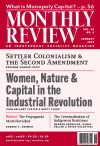2018

Sara Farris’s In the Name of Women’s Rights is a brave monograph that analyzes the way that the discourses of Europe’s right-wing nationalists, government agencies, and liberal feminists converge in their representations of Muslim and non-western immigrant women, relegating these communities to commodified spheres of social reproductive work. | more…

The recent rise of social reproduction theory represents one of the most remarkable attempts to extend historical materialism in our time. The Review of the Month in this issue, “Women, Nature, and Capital in the Industrial Revolution,” is intended as a contribution to this rapidly growing body of work. | more…

Examining the historical specificity of women’s lives and labor in England during the Industrial Revolution allows us to better analyze the assumptions regarding gender, family, and work that informed the writings of Marx and Engels—and ultimately to understand how capital as a system threatens the social and ecological bases of human life. | more…

The United States was founded as an empire on conquered land, and firearms manufacturing was one of the country’s first successful modern industries. Gun proliferation and gun violence today are among its legacies. | more…

The Criminalization of Indigenous Resistance
Indigenous peoples of the Americas are on the frontlines of resistance to the environmental and social costs of the unthinking drive for capital accumulation. From the United States and Canada to Brazil and Chile, that resistance has been met by state surveillance, repression, and criminalization. | more…

In Manufacturing Consent (1988), Noam Chomsky and I put forward a “propaganda model” as a framework for understanding how and why the mainstream U.S. media operate within restricted assumptions, depend uncritically on elite sources, and participate in propaganda campaigns helpful to elite interests. In this article I describe the model, address some of the criticism leveled against it, and discuss how it holds up today. | more…

“Monopoly capital” is a term for the new form of capital, embodied in the modern giant corporation, that in the late nineteenth century began to displace the small family firm as the dominant economic unit, marking the end of the freely competitive stage of capitalism. | more…






